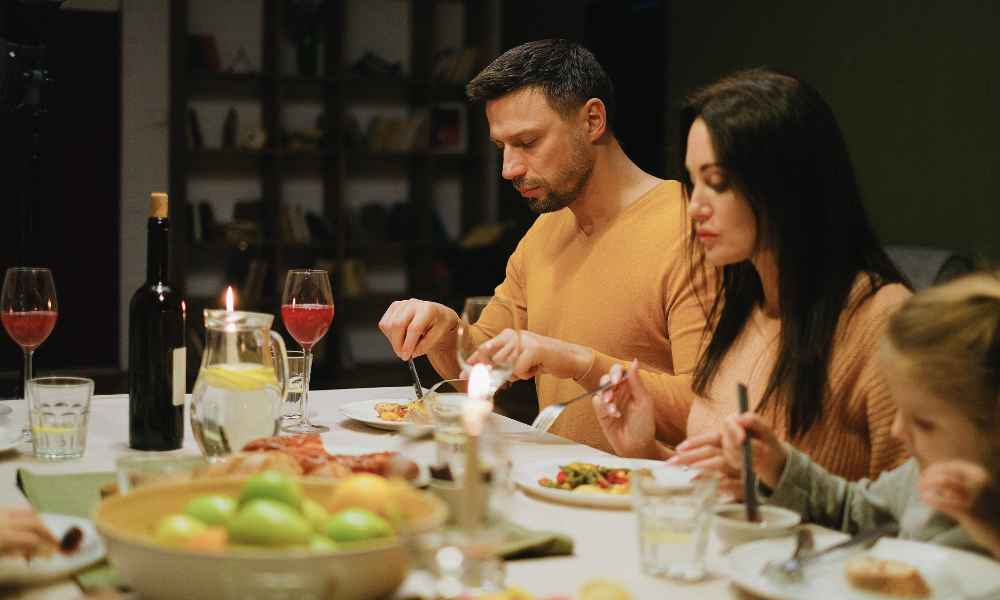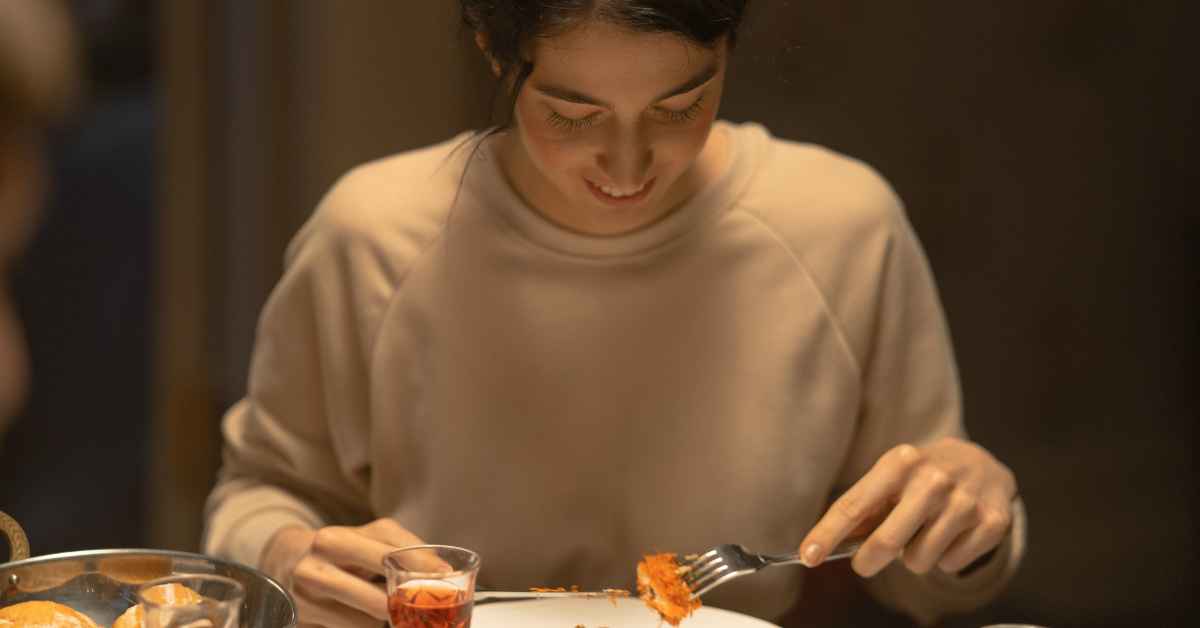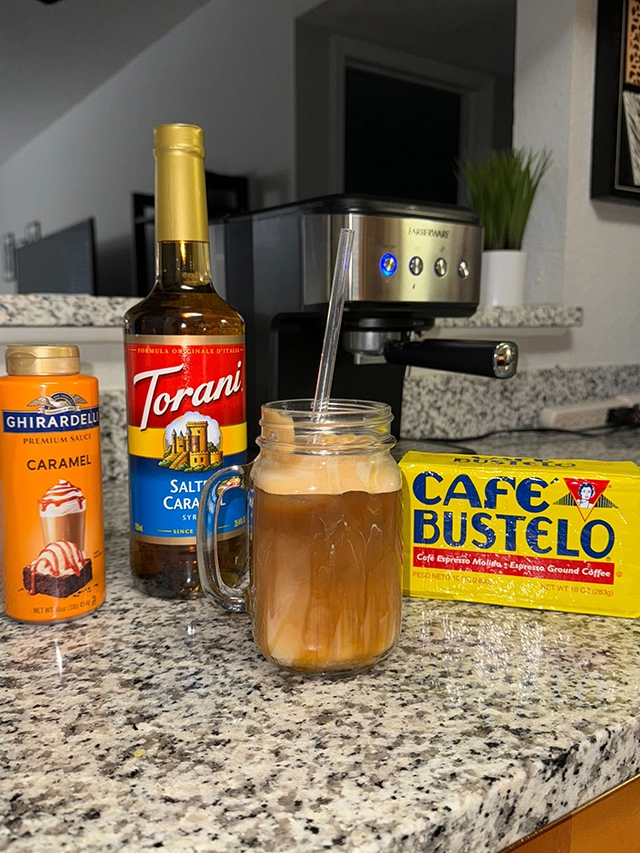Last Updated on December 9, 2025
Do you often find yourself asking, “What should I eat for dinner?” Or do you wonder when the best time to eat dinner is? Well, you’ve come to the right place!
As a dietitian, I’m going to tell you what to eat when you’re not sure what to eat for dinner AND how to know when the best time to eat dinner is! Now I want you to remember there is no right or wrong answer to “what should I eat for dinner?” There are actually many different foods and meals that you can enjoy for dinner.
What is very important though is to have a balanced dinner meal. Understanding what makes up a balanced dinner can be very beneficial.
There is some emerging research showing there are more ideal times to eat dinner, so I will address this topic for you as well. But let’s start by looking at how to build a balanced dinner meal.
What should I eat for dinner? Start with a balanced plate:
Vegetables
Vegetables provide your body with the bulk of your vitamins, antioxidants, fibre/fiber and phytochemicals. They should be your go-to food when you ask yourself questions like “what should I eat today?” or “what should I eat right now?”
Vegetables should always be part of the picture. Try filling half of your dinner plate with colourful/colorful vegetables and salad. This should equate to about three cups or more of salad or vegetables. These could include mixed salad greens, baked vegetables, coleslaw mix and stir-fried vegetables. Aim for at least three different coloured/colored vegetables; in this case, more is better. In other words, eat the rainbow!
Carbohydrates
Carbohydrates are important to include in your dinner meal. Especially from a high fibre/fiber source, they keep you feeling full and your gut healthy. On top of that, they provide slow-burning energy along with other essential nutrients.
Fill one-quarter of your dinner plate with high fibre, slow-burning carbohydrates. This should be roughly the size of your clenched fist.
Carbohydrates can include sweet potato, potato, corn, lentils, beans, chickpeas, whole grain rice, quinoa, whole grain pasta or whole grain bread.
Protein
Adding protein to your dinner is important, as it will keep your blood sugar levels more stable, which means less mood swings, more stable hormones and longer lasting fullness. So fill the remaining quarter of your dinner plate with lean protein. This will equal about the size of your palm or 100-150g (approx. 3-5 oz.). Healthy protein options include fish (e.g. oily fish like salmon and tuna or white fish), lentils, eggs, beans, tofu and tempeh.
Healthy fats
Finish balancing your dinner plate with a serving of healthy fats. This will be roughly one or two tablespoons. Fats will help you stay fuller for longer, allowing your body to absorb the fat-soluble vitamins D, E, K and A and make your meal taste better. Healthy fats include extra virgin olive oil, which is used in cooking or as a dressing with avocado, nuts or seeds.
Here is a video demonstrating how I plate up my own dinner meals when someone asks me what I eat in a day. It follows the balanced dinner plate method I outlined above and is a good visual to refer to when figuring out what to eat for dinner.
6 Healthy Dinner Recipes

When you do find yourself asking, “What should I eat for dinner?”, recall the importance of building a balanced dinner meal. Just as examples, here are six balanced dinner recipes you can try.
On top of being balanced, these meals are also quick and easy to make, making them perfect for dinner almost any night of the week.
- Budget-Friendly Sweet Potato and Pumpkin Bean Bowls
- Cheap Creamy Coconut Chickpea Curry
- Pumpkin and Potato Omelette/Omelet
- Super Broccoli and Salmon Stir Fry – Lunch or Dinner
- Rainbow Superfood Salad
- Salmon Soba Noodle Stir Fry
Now that we have looked at what should you eat for dinner, let’s look at when you should eat dinner.
When is the best time to eat dinner?

There are many factors to consider when deciding what is the best time to eat dinner. You need to think about your lifestyle, health, hunger levels, family, personal preferences and when you eat your other meals.
While there is also no right or wrong answer to how often should you eat, there is some emerging research showing there are more ideal times to eat, or not eat, including dinner.
This research is finding that if your eating time for dinner is too late at night, it may negatively affect your health due to chrono-nutrition.
What is Chrono-Nutrition?
Chrono-nutrition refers to coordinating your food intake with your body’s daily rhythms – that is, your “body clock”. Your circadian rhythm dictates when is the most important time for you to sleep, eat and work. You are made to eat and expend the majority of your energy during the daytime and then sleep and not eat (or fast) overnight.
When you eat according to your body’s natural circadian rhythms, your energy can be used most efficiently. However, if your eating time is too late at night, you disrupt your body’s natural rhythm. A disruption to this rhythm can potentially throw your body’s natural rhythm out of balance.
Your body processes food differently at night than it does during the day. It has been found that late-night eating causes an increased blood glucose and insulin response compared to daytime eating. This may potentially increase your risk of chronic diseases.
The best times to eat
The research also indicates that eating a more significant proportion of your total calorie intake earlier in the day can have a more positive effect on your heart health and blood sugar control.
Eating more of your calories at breakfast and less at dinner can help with healthy weight loss and reduce your risk of metabolic syndrome. Some research even indicates that consistent overnight fasting has many positive effects on health.
So to answer our original question of “what is the best time to eat dinner?”, there is no “best” time to eat. However, you should avoid making your dinner time too late at night. Eating earlier will allow your body to follow its natural circadian rhythms, thereby processing energy more efficiently and potentially benefiting your overall health.
So find a time that is earlier in the evening that works for you, your family and your lifestyle. It should complement your body’s natural rhythms. If you currently eat dinner late at night (say 9 pm, 10 pm or later), see if you can shift this to an hour or two earlier.
This may take some extra planning, including meal planning and prepping, but meal prepping is actually fairly easy with any of my favourite/favorite meal prep recipes.
Conclusion
Whether for interpersonal or health reasons, dinner should absolutely be considered an important meal of the day. So when you are asking yourself, “What should I eat today?” or “What should I eat for dinner?”, aim for a balanced dinner meal that follows the balanced plate method discussed above. Ideally, you should avoid eating your dinner too late at night to best serve both your health and lifestyle.
Melon Sour Magic: Sip into Summer with this Refreshing Twist
Indulge in the perfect balance of sweet and…
Iced Caramel Macchiato: Indulge in Icy Sweetness at Home
Refreshing waves of caramel goodness in every sip….
Romantic Refresher: Red Raspberry Drink for Valentine’s Day Bliss
Romantic Refresher: Red Raspberry Drink for Valentine’s Day…
Spice Up Your Night: Cinnamon Toast Crunch Shot Recipe for Party Perfection!
Savor the delightful warmth of nostalgia with each…
What should be in every dinner?
A portion of lean meat, skinless poultry, fish, or a meat substitute.
A portion of whole grain bread or grain-based product, or a side dish containing starchy vegetables or legumes.
A generous serving of diverse vegetables or salad with vibrant colors.
For dessert, opt for a fruit-based treat accompanied by low-fat milk or yogurt if desired.
What is the best night dinner time?
What is the ideal timing for dinner? It is recommended to have dinner approximately four to five hours after having lunch. It’s important to note that if your dinner falls within the 5 p.m. to 6 p.m. timeframe, you will be approaching the final hour of your body’s increased metabolic rate.
Should I eat when I’m hungry at night?
According to Aimee Takamura, a registered dietitian and director of wellness and sustainability at Restaurant Associates, if you feel hungry, it is important to eat something regardless of the time of day. She emphasizes that eating late at night does not significantly impact metabolism or cause the negative effects that might be commonly believed.
- Rebecca Gawthorne
- Rebecca Gawthorne





